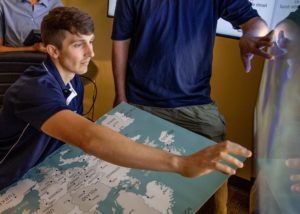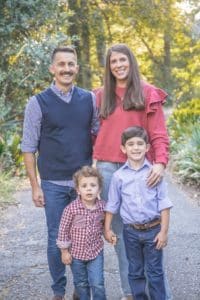 Where did you attend college and what was your major?
Where did you attend college and what was your major?
- Georgia Tech – Bachelor of Science in Biomedical Engineering (2009) and Ph.D. in Electrical and Computer Engineering (2017)
- Mercer University – Master of Science in Engineering in Software Engineering (2012)
What were you involved in during your time at FPD?
- Summer baseball and basketball camps in elementary school
- Middle school baseball and basketball
- Junior Beta and Beta Clubs
- Spanish Club
- Track (sprints, middle distance, shot put,and discus)
- Football
- Math Team
- Cross Country
- Mulberry Street United Methodist Church mission trips to New Orleans and Costa Rica
Are there any specific teachers/coaches that had an impact on you?
Mrs. Henley, Dr. Shealy, and Dr. Waters! The curiosity and desire to excel in science labs and mathematical problem-solving that each of them instilled in me ultimately guided me toward a career in engineering.
What is your favorite FPD memory?
I really enjoyed my time on the cross country and math teams. While practicing over the summer and fall for the cross-country season, it was awesome just being around all of my teammates and pushing each other to get better. With the math team, it was not only intellectually stimulating but it also gave me the opportunity to visit several college campuses: Georgia Tech, Mercer, Furman, Berry, Georgia Southern and Middle Georgia State. With cross country, I had the opportunity to visit Florida State as well for an invitational meet. Getting those opportunities to venture outside my comfort zone as I was looking ahead to college while building bonds with my classmates was a unique experience FPD provided me.
Tell us a little about what you’re doing now.
I am a Senior Research Engineer at the Georgia Tech Research Institute, supporting projects for the Department of Defense, developing novel solutions, and conducting analyses in wargaming and military operational scenarios through modeling and simulation. It’s been an extremely rewarding and interesting experience. The research problems I get to work with provide valuable insights to our warfighters that would be too costly or nearly impossible for the military to conduct in the real world.
What specific project that you’ve worked on recently that was particularly interesting or rewarding?
This past August, my group wrapped up a project for the Defense Threat Reduction Agency (DTRA) within the Department of Defense to provide wargaming and simulation support as it relates to the integration of conventional or tactical nuclear capabilities in a ground-based military scenario.Our delivery to DTRA was a collection of techniques, recommendations, and software enhancements to train and educate combat personnel on this subject.
The project and the work it involved was really a complete team effort. I had the opportunity to collaborate with a collection of experts in military decision-making, nuclear engineering, and data analytics while providing my expertise in software simulation to design and implement enhancements to existing military simulation applications. In addition to the diverse set of expertise, we needed to integrate a variety of capabilities and applications, and l was responsible for bringing all these pieces together under a cohesive software architecture. Given current events, what we provided to DTRA through this project feels that much more relevant and beneficial, and the knowledge I gained on
the topic has given me a greater understanding and respect for its mission to “deter strategic attack against the United States and its allies to prevent, reduce, and counter WMD and emerging threats; and prevail against WMD-armed adversaries in crisis and conflict.” (https://www.dtra.mil/About/Mission/)
 How do you feel like your academic experience at FPD prepared you for your current career?
How do you feel like your academic experience at FPD prepared you for your current career?
FPD provided a perfect educational balance in several ways. It prepared me with a foundation in sciences and mathematics that gave me the proper background for a career in STEM, but it also focused on developing skills in communicating, writing, and critical thinking through the literature, language, and social studies curricula.
As an example, AP US History with Cindy Roberts was more than just a course that covered dates and facts from history; it’s the class where I learned how to develop and compose a logical and competent essay argument. The teachers at FPD also understand how to provide a balanced workload in and out of the classroom so it was rare that the assignments we were given felt like just busy work. That aspect really helps keep students engaged and interested in the material in a way that encourages further learning and thinking, which is key to the purpose and work of an engineer.
Tell us about your family.
My wife, Sloane, and I got married in 2011 in Orange Beach, AL. We lived in Lizella while I worked on my Ph.D. and she worked at FPD in the Preschool building and with the Center for Discovery. She and I enjoy traveling – visiting Ireland, Barcelona, Banff National Park, London, Jamaica, and Costa Rica. We’ve ventured on an Alaskan cruise and checked out a number of other places in the US as well. Just before I graduated in 2017, we had our first son, Knowles, who is now in Kindergarten at FPD. In 2020, our second son, Lawton, was born, and we’ll start him in 3K at FPD next year.
Outside of work and school, we all enjoy going to Georgia Tech football games and other fun sites in Atlanta. Knowles has enjoyed two seasons of Viking Soccer League and multiple Center for Discovery camps! Go Vikings!
